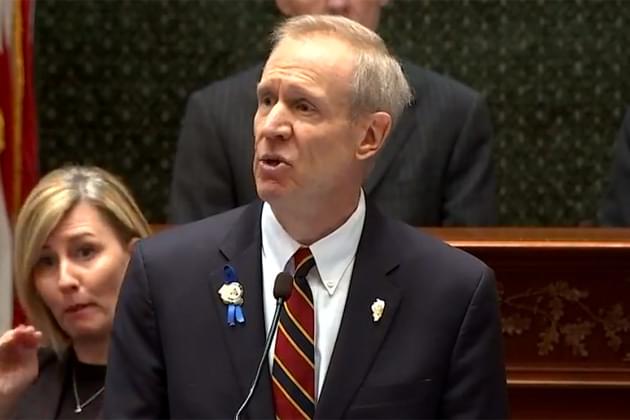
By Illinois Radio Network
SPRINGFIELD – A national organization is criticizing Governor Bruce Rauner’s proposal to reinstate the death penalty for certain crimes in Illinois.
Heather Beaudoin is the coordinator of Conservatives Concerned About the Death Penalty, a network of political and social conservatives who question the alignment of capital punishment with conservative principles and values. She said arguments in favor of the death penalty often don’t withstand scrutiny.
“The idea of the death penalty being a deterrent … we’ve just not seen it to be true,” Beaudoin said. “These situations are crimes of passion, often, where the person perpetrating the crime is not thinking about consequences. And I get sort of heated when I hear folks say, ‘We have to have the death penalty for victim’s family members,’ because I’ve personally spoken with so many of them who say it was the opposite of helpful.”
Beaudoin said the governor’s plan to limit the punishment to specific cases doesn’t make the idea any better.
“What that does is create a class of victims,” Beaudoin said. “It’s very difficult when you’re talking to a mother who has lost a child to homicide and you’re telling her your loved one’s murder is not quite heinous enough. We’ve seen it’s problematic when we pick-and-choose which are the most heinous crimes that receive a death sentence.”
Rauner’s proposal would allow the death penalty as potential punishment for mass killers and those who slay police officers. There are at least three plans to reinstate the death penalty including Rauner’s, which he added in an amendatory veto to legislation that originally sought to lengthen the waiting period for certain firearms from one day to three days.
State Rep. Jim Durkin, R-Western Springs, introduced a standalone bill to reinstate the death penalty late Thursday. Durkin also backed a slightly different death penalty bill introduced Thursday by state Rep. Jerry Costello, D-Smithton. Costello’s bill included both police and firefighters and had bipartisan support. All three proposals would set a higher standard of guilt – “beyond all doubt” rather than “beyond reasonable doubt” – for capital crimes.
“That’s a really impossible standard,” Beaudoin said. “You can’t have a system that doesn’t make mistakes because it’s run by human beings. Even when there is DNA evidence available, that evidence is handled by human beings. So we’ve seen cases where a technician has made a mistake and we’ve also seen cases where there’s been major fraud.”
Some have argued Rauner’s death penalty proposal is a political move designed to shore up support among conservative voters in an election year. Beaudoin said it might not work out that way.
“This is an old-school tactic – using the death penalty as a political football,” Beaudoin said. “We’re seeing that it just doesn’t work. And it doesn’t work because there are far more conservatives that are against the death penalty now than ever before.”
Rauner’s package of public safety proposals was detailed in the governor’s amendatory veto of a gun control bill. In addition to bringing back the death penalty, Rauner proposed putting a 72-hour waiting period in place for all firearm purchases, banning bump stocks and trigger cranks, authorizing restraining orders to disarm dangerous people, and requiring judges and prosecutors to explain why charges are reduced in plea agreements for violent offenders in gun cases. Rauner laid out his reasons for the death penalty in a veto message to the House of Representatives.
“Anyone who deliberately kills a law enforcement officer or is a mass murderer deserves the death penalty,” the message said. “There are legitimate reasons for concern about the death penalty, reasons that I take seriously. Chief among those concerns is the alarming number of people who have been convicted by juries ‘beyond a reasonable doubt’ and sentenced to death, but were later exonerated based on DNA or other evidence, demonstrating that the jury convicted the wrong person. Consequently, the only morally justifiable standard of proof in a death penalty case is ‘beyond all doubt.’ This standard would apply not only at trial but also on appeal.”
The death penalty has not been carried out in Illinois since 1999, when Andrew Kokoraleis was killed by lethal injection for the murder of Lorraine Ann Borkoski. In 2000, then-Gov. George Ryan declared a moratorium on executions in Illinois. Eleven years later, then-Gov. Pat Quinn signed a bill abolishing the death penalty. Nineteen states have abolished the death penalty for all crimes. Thirteen others have an official moratorium on the practice, or have not carried out an execution in more than a decade.
“I don’t see that there’s a way for us to have a system that’s foolproof,” Beaudoin said. “Wrongful convictions will absolutely happen and innocent people will be convicted and sentenced to death. That’s a dream world to think we have a system that functions perfectly.”






